| Srl | Item |
| 1 |
ID:
085832
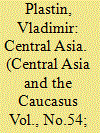

|
|
|
|
|
| Publication |
2008.
|
| Summary/Abstract |
There is a more or less general agreement among political scientists that the center of gravity of the most important (or even critically important) world developments is shifting toward Central Asia. The sequence of events brings us back to square one: the Soviet Union's disintegration and the emergence of the newly independent states. A potential boon that could have opened access to the region's oil and gas riches and could have enriched the local states and their extra-regional partners was buried by the inadequate behavior of the sides involved. Business cooperation presupposes mutual understanding and mutual concessions for the sake of mutual benefit
|
|
|
|
|
|
|
|
|
|
|
|
|
|
|
|
| 2 |
ID:
085829
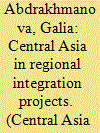

|
|
|
|
|
| Publication |
2008.
|
| Summary/Abstract |
From the very first days of their independence the post-Soviet Central Asian states rich in natural resources and ruled by elites with little (if any) experience in international affairs have been objects of close attention by external players who hastened to the Eurasian geopolitical arena to put pressure on what looked like easy prey. Today multisided integration structures have been and remain a popular lever of pressure.
|
|
|
|
|
|
|
|
|
|
|
|
|
|
|
|
| 3 |
ID:
085830
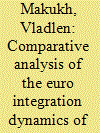

|
|
|
|
|
| Publication |
2008.
|
| Summary/Abstract |
Relations with the European Union within the framework of the European Neighborhood Policy (ENP) are extremely important for the European integration of its partner countries. So researchers can glean something from the experience accumulated in the East European and Caucasian countries' relations with the European Union within the framework of the ENP. This article looks at how a corresponding balance is being found in Ukraine's and the Caucasian countries' relations with the EU based on the results of the European Neighborhood Policy in the Arab Maghreb states (at the EU-Morocco, EU-Tunisia, and EU-Algeria levels).
|
|
|
|
|
|
|
|
|
|
|
|
|
|
|
|
| 4 |
ID:
085841
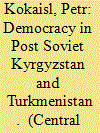

|
|
|
|
|
| Publication |
2008.
|
| Summary/Abstract |
The economic impact of globalization usually draws the most attention, while the accompanying aspects, which may include the transformation of an entire culture, are mentioned only secondarily. However, deeper transformational changes occur in culture and the social structure, which also affects changes in an individual's thinking and reasoning.
|
|
|
|
|
|
|
|
|
|
|
|
|
|
|
|
| 5 |
ID:
085837
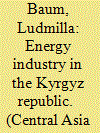

|
|
|
|
|
| Publication |
2008.
|
| Summary/Abstract |
The energy industry is of special importance to Kyrgyzstan. Most of the electric power generated is used to meet the economy's intermediate needs in industrial and agricultural production.
|
|
|
|
|
|
|
|
|
|
|
|
|
|
|
|
| 6 |
ID:
085840
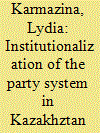

|
|
|
|
|
| Publication |
2008.
|
| Summary/Abstract |
The democratic changes underway in the Republic of Kazakhstan and the Russian Federation are focused on the development of parties and the party system, which explains the immense interest in the process demonstrated by their own and foreign communities of political scientists. They concentrate on the emergence and stages of the parties' development, their legal institutionalization, the "party of power" phenomenon, conduct of parties in election campaigns, the way a definite type of party system took shape, etc.
|
|
|
|
|
|
|
|
|
|
|
|
|
|
|
|
| 7 |
ID:
085835


|
|
|
|
|
| Publication |
2008.
|
| Summary/Abstract |
As early as the 18th-19th centuries, the political disagreements among Great Britain, Russia, and Turkey over the Caspian Sea region brought about significant changes in its diplomatic reality. After World War I and II, the policy of the great powers also changed the diplomatic landscape of this region, which, despite all of the disputes, remained in the center of international attention. Control over the Caspian began to largely be viewed within the framework of the influence of the two main powers in the region: the Soviet Union and Persia.
|
|
|
|
|
|
|
|
|
|
|
|
|
|
|
|
| 8 |
ID:
085833
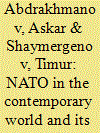

|
|
|
|
|
| Publication |
2008.
|
| Summary/Abstract |
In 2008 the Institute of World Economy and Politics at the First President of the RK Foundation together with the Eurasian Rating Agency circulated a questionnaire in the expert community of Kazakhstan on NATO's role in the contemporary world and its relations with the RK. The authors have undertaken to summarize the results.
|
|
|
|
|
|
|
|
|
|
|
|
|
|
|
|
| 9 |
ID:
085831
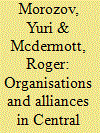

|
|
|
|
|
| Publication |
2008.
|
| Summary/Abstract |
Between 29 April and 1 May, 2008 we attended an international conference that discussed Central Asian security issues. Political scientists and politicians from 17 countries and several international structures gathered in Tashkent for this highly representative forum to assess the already obvious threats to Central Asian security; discuss the new and less obvious threats and challenges; and outline potential cooperation trends aimed at ensuring regional security in the 21st century.
|
|
|
|
|
|
|
|
|
|
|
|
|
|
|
|
| 10 |
ID:
085834


|
|
|
|
|
| Publication |
2008.
|
| Summary/Abstract |
The strategic gap between India and Pakistan compels Islamabad to pay attention to its northern dimension, namely Afghanistan and Central Asia. For this reason, in order to avoid being threatened from the North and the South at the same time, Pakistan has always tried to get a friendly government in Afghanistan. During the 1980s and the 1990s a series of events, such as the invasion of Afghanistan, the involvement of Pakistan in the conflict and then the emergence of War on Terror, have changed dramatically the regional situation. At the end of the 1990s there were two separate Regional Security Complexes, the Central and the South Asian ones, divided by Afghanistan, an insulator state. At present, we see how these two Regional Security Complexes have converged in a common point-Afghanistan-which is the hub of a new Regional Security Complex (South-Central Asian RSC) involving these two regions.
|
|
|
|
|
|
|
|
|
|
|
|
|
|
|
|
| 11 |
ID:
085836
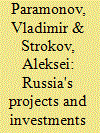

|
|
|
|
|
| Publication |
2008.
|
| Summary/Abstract |
In the 1990s, Russia's projects and investments in the Central Asian oil and gas industry were mainly concentrated in Kazakhstan, while its interest in other states of the region were minimal. When Vladimir Putin became Russian president in 2000 and the price of hydrocarbons steadily rose, Central Asia's importance abruptly increased. This caused the Russian Federation and Russian oil and gas companies to drastically step up their activity not only in Kazakhstan, but also in Turkmenistan and Uzbekistan. Russia has also started to show a much greater interest recently in two other states-Kyrgyzstan and Tajikistan-despite their low oil and gas potential.
|
|
|
|
|
|
|
|
|
|
|
|
|
|
|
|
| 12 |
ID:
085838


|
|
|
|
|
| Publication |
2008.
|
| Summary/Abstract |
The main research question is "Will political maneuvering between China and Russia result in higher export price for Uzbek gas?" This is especially peculiar given the fact that many analysts consider the price that Russia pays for Uzbek gas to be lower than a fair market price. Currently, the price of gas exports from Uzbekistan is $160 per 1,000 cu m. On the other hand, Gazprom charges its European customers an average of $350 per 1,000 cu m.
|
|
|
|
|
|
|
|
|
|
|
|
|
|
|
|
| 13 |
ID:
085839
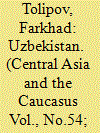

|
|
|
|
|
| Publication |
2008.
|
| Summary/Abstract |
believe that post-Sovietism is the aptest way to describe the wide-scale transformations unfolding in the post-Soviet era in the newly independent Central Asian states. It presupposes that certain new, modern institutional qualities of nation- and state-building will appear because of the very natural need to adjust to the existing world order.
|
|
|
|
|
|
|
|
|
|
|
|
|
|
|
|